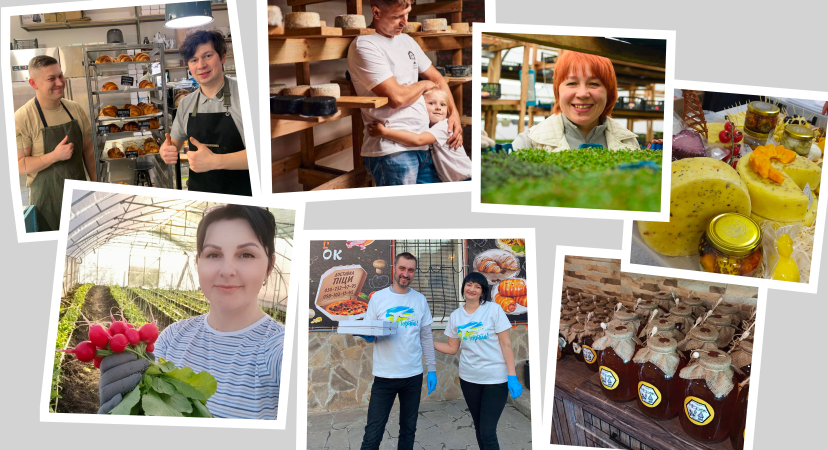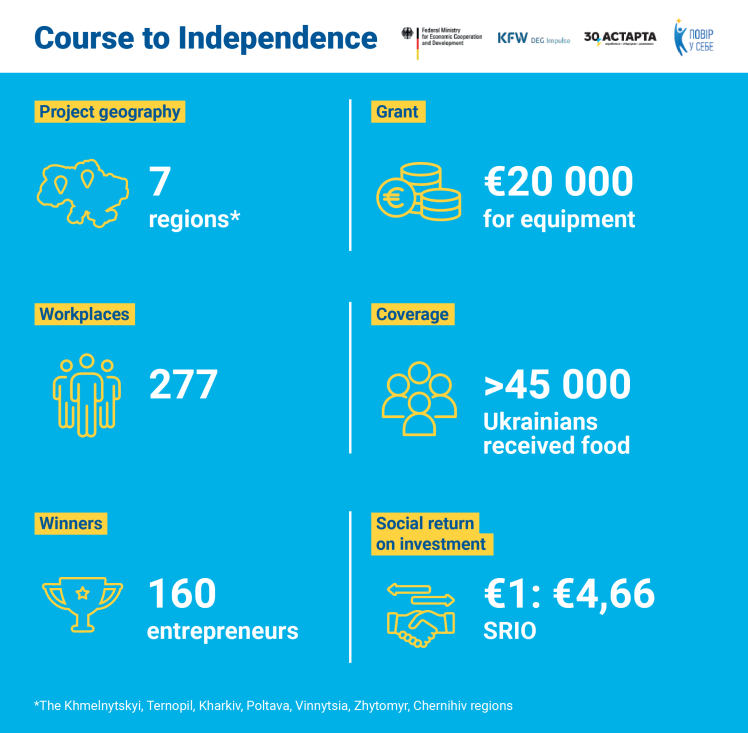
The Charitable Foundation «Believe in Yourself», with the support of the German Government, the German Development Bank DEG, and the agricultural holding Astarta, helps the regional entrepreneurs develop their production. Last autumn, 60 businesses received grants for equipment purchase as part of the «Course to Independence» project. In November 2023, another 100 entrepreneurs became the winners of the second wave of the project.
How does big business instil social responsibility in small Ukrainian entrepreneurs and help them open doors to new opportunities? What do the project winners receive besides money, and how do they make their business dreams come true?
The main things about the «Course to Independence»
Viktor Ivanchyk, CEO of Astarta, the co-founder of «Believe in Yourself»
Who receives grants?
Food and processing industry representatives. There are several reasons for this. Residents of small villages were the first to face a food shortage, including bread and pasta, at the beginning of the full-scale war, which was delivered to them from large cities. And local small producers will be able to fill such gaps in our countryʼs food security.
It is a tangential area of Astartaʼs business, and we have the relevant business competencies and expertise to share with entrepreneurs.
But there is one more peculiarity. Priority is given to entrepreneurs of such categories as veterans or family members of military personnel, temporarily displaced persons, and people with disabilities. If the entrepreneur himself is from a different type, he must commit to hiring people from these categories.
The project helps small and micro-entrepreneurs — why do you think these are Ukraineʼs most vulnerable business sectors today?
Small businesses form the middle class and are the key to Ukraineʼs economic growth. Small private entrepreneurs who developed in the territories occupied and damaged by russian shelling often lost everything: money, equipment and premises. While large businesses can recover over time, small and micro enterprises die from a lack of funds or delays in their provision.
What problems of small businesses does the project solve besides access to finance?
There is a need for more quality knowledge in the business sector: entrepreneurs need to understand planning rules and calculate expenses and income, taxes, and wages. So, we taught them how to use grant funds as efficiently as possible.
Why did you set the conditions under which the project winners have to create jobs and donate 10% of the cost of the equipment received to the community in terms of manufactured products?
We need these businesses to produce products and bring social benefits to communities, pay all taxes, and employ officially.
It is thanks to this 10% that communities form their food bank. In one of the communities, our entrepreneur grows vegetables and fruits, some of which he donates to schools. Another provides food to a hospital for the military. The third one provides food packages to low-income families and temporarily displaced persons.
Why does Ukraine need such a project during the war?
Small businesses are the sprouts that contribute to the growth of Ukraineʼs economic and social potential. It includes creating jobs, increasing budget revenues, encouraging Ukrainians who have moved abroad to return home, increasing exports, and increasing Ukraineʼs investment attractiveness.
How did «Believe in Yourself» and Astarta manage to win the trust of the German bank to cooperate in the humanitarian field?
Astarta has long-standing business contacts with DEG Bank. By the way, DEG was one of the first to offer and implement its assistance. The experience of such cooperation is precious because everyone is committed to maximising the result. The highly professional DEG team ensures communication with the German Government, which approved the allocation of these funds, administers the project and knows the situation in Ukraine very well. We are constantly in touch.
Everything is transparent and structured. We signed a trilateral agreement with the bank with clearly defined terms. An independent external auditor confirms all financial transactions within the project. In this way, the charitable fund and the agro-industrial holding report to their partners, especially since transparent reporting is a common practice for us.
How did «Believe in Yourself» and Astarta manage to win the trust of the German bank to cooperate in the humanitarian field?
Astarta has long-standing business contacts with DEG Bank. By the way, DEG was one of the first to offer and implement its assistance.
The experience of such cooperation is precious because everyone is committed to maximising the result. The highly professional DEG team ensures communication with the German Government, which approved the allocation of these funds, administers the project and knows the situation in Ukraine very well. We are constantly in touch.
Everything is transparent and structured. We signed a trilateral agreement with the bank with clearly defined terms. An independent external auditor confirms all financial transactions within the project. In this way, the charitable fund and the agro-industrial holding report to their partners, especially since transparent reporting is a common practice for us.
How did «Believe in Yourself» and Astarta manage to win the trust of the German bank to cooperate in the humanitarian field?
Astarta has long-standing business contacts with DEG Bank. By the way, DEG was one of the first to offer and implement its assistance.
The experience of such cooperation is precious because everyone is committed to maximising the result. The highly professional DEG team ensures communication with the German Government, which approved the allocation of these funds, administers the project and knows the situation in Ukraine very well. We are constantly in touch.
Everything is transparent and structured. We signed a trilateral agreement with the bank with clearly defined terms. An independent external auditor confirms all financial transactions within the project. In this way, the charitable fund and the agro-industrial holding report to their partners, especially since transparent reporting is a common practice for us.
Clemens Finger, Senior Investment Manager, DEG
Why did you choose these partners?
For more than 60 years, DEG has been financing and advising private enterprises operating in developing and emerging-market countries. Our mission: As an impact and climate investor, we accompany entrepreneurs who are addressing transformation and aiming to seize their opportunities.
Before we started to work with Astarta, we had known the company for many years as one of the most relevant and innovative players in Ukraineʼs private sector and its world-class agribusiness industry.
Due to Astartaʼs very well-developed culture of corporate governance and environmental and social management, it was extremely easy for us at DEG to connect with the company. We are delighted with the cooperation that has emerged since our first investment.
What were the reasons for DEGʼs decision to participate in the project?
DEG started its cooperation with Astarta by financing the infrastructure of its core operations in Ukraineʼs rural areas. Therefore, we are, of course, very interested not only in Astarta as a company but also in the rural communities in which the company operates. Supporting members of the communities in their ambitions to become private entrepreneurs, benefitting from Astartaʼs resources on the ground, appeared very logical and compelling to us.
Sonja Hoos, Senior Manager, DEG Impulse
We also wanted to ensure that we supported a project based on existing infrastructure and offered continuous support even after the project ended.
The «Heading towards Independence» project of Astarta takes all of this into account. What immediately convinced us about the project were the high level of professionalism, the fast and effective help, the hands-on approach, continuous monitoring by the charitable fund and Astarta, and the high transparency. For this reason, we have decided to support the project with our Business Support Services — from funds from the German Federal Ministry for Economic Cooperation and Development.
How does DEG see the goal of the project?
The project creates and safeguards jobs and sustainable food production through the selection, training and financial support of agricultural micro-entrepreneurs, many of whom are women with children and internally displaced persons. Moreover, it supports the market entry of entrepreneurs through establishing networks and their inclusion into Astartaʼs supply chain. Another primary outcome of the project is to provide the local communities with agricultural products, ensuring food security in war conditions.

They helped me get back on my feet. Winning entrepreneurs about the «Course to Independence»
Marina Shlyakhta is originally from Donetsk. In 2015, she moved to Myrhorod with her daughter. «I had my own business but wanted to open a bakery».
In November 2022, she received a call from the Myrhorod City Council and was invited to participate in a competition. During a power and internet outage, Maryna recalls writing her business plan in less than a week. Participation in the project was life-changing for her — a month after winning, the entrepreneur received equipment. In January 2023, the StrudelOk bakery opened its doors.
Maryna bakes sweet pastries and bread daily and sells it to socially disadvantaged citizens. Under the terms of the project, she also hired three employees and regularly delivered products to a nursing home.
«The ʼCourse to Independenceʼ inspired me, taught me business planning, and made me believe in my strength. In difficult times, Astarta helps us with money and advice, and most importantly, it believes in us, the IDP entrepreneurs. We need support so much, and the agricultural holding provides it incredibly well!» says the entrepreneur.
Thanks to winning the project, the Mriya Gardening Society has also expanded. In August 2022, the war forced Mriya to relocate from Sloviansk to the village of Reshetylivka in the Poltava region.
After the move in August 2022, Mriya began to look for grants to help it survive. The local Office of the Deputy Prime Minister for European Integration told them about the ʼCourse to Independenceʼ and helped them with a business plan.
The company now produces pasteurised apple juice, vinegar, tomato paste, jam, ketchup and adjika under the Adamivka brand. The company employs five people and involves more than 100 households in the production chain. «The apples and tomatoes are grown by local households,» says Ivan Dehtiar, the gardening societyʼs board chairman. «Mriya distributes seedlings to them and then buys the fruit.»
«After the project, Mriyaʼs financial performance increased fourfold. If in 2022 we cooperated with 14 households, fifty want to work with us next year,» says Ivan Dehtiar.
The source Forbes Ukraine
